Choosing windows and doors for self-build homes is a significant buying decision if you are embarking on creating a new home from scratch or even a major renovation. Not only do the windows and doors add a lot to the overall appearance of your home, but their performance matters for security, energy efficiency and weather protection. The lifespan you expect from your new windows and doors may also be essential to the window choices if your expectation is for the glazing to last as many years as possible. This article gives some tips and advice on choosing windows and doors for self-build homes and, importantly, whether aluminium, timber, alu-clad or even PVCu windows and doors are best.
Why windows and doors for self-build homes is a significant investment.
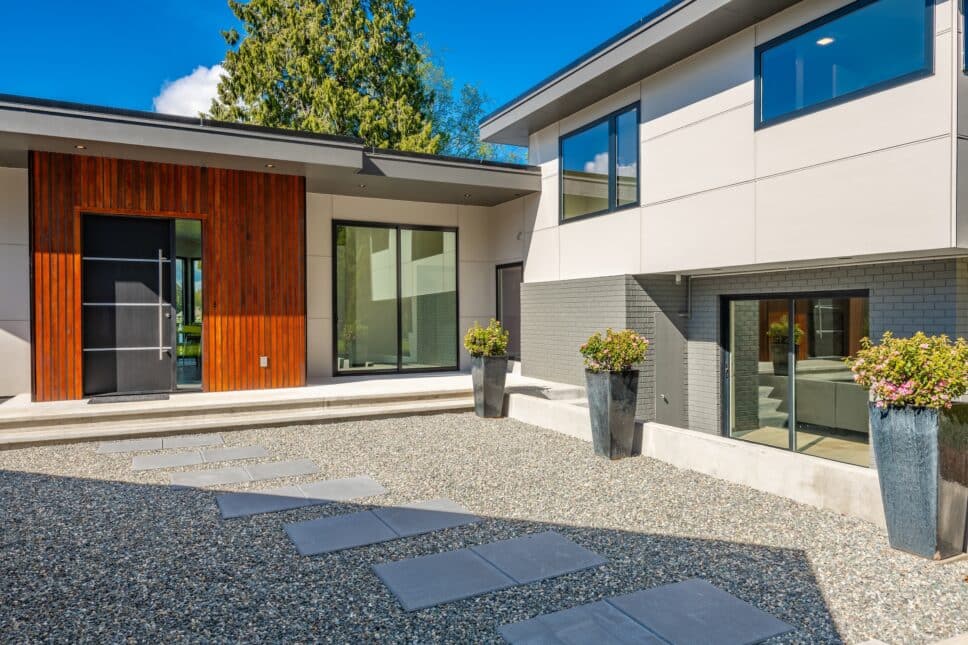
With glazing being a significant part of your new home’s fabric and performance, this element of your project is a substantial investment. Your building structure performs an important function, as do your windows and doors. It is worth thinking about how much we actually interact with our doors and windows. The front door is probably the most used, but overall windows enhance rooms and the overall living experience. Of course, the budget will be important when choosing windows and doors for self-build homes, as well as styling and appearance. You will invariably want pleasing window styling, giving a feeling of space and light without too much bulk in their appearance.
Doors can be a more important choice than windows, so it is worth considering whether it is worth spending more of the budget on getting the best patio and other doors, compromising with slightly cheaper windows. You will use your patio doors much more than you will your windows. These are larger and heavier, with greater demands placed on them. It is fine to mix brands – you do not have to have windows and doors from the same manufacturer or system.
Ventilation is also important because there are rooms you will use more than others and will need these to provide good airflow when required as well as passive background ventilation through trickle ventilators or other means.
There remains some misinformation around frame materials used in marketing messages, so hopefully, we can clear these up and give you some practical advice.
The reality today is that all windows and doors for self-build homes provide reasonable specifications, so you can expect satisfactory performance, whatever material or brand you go with. Rather than extol the virtues of aluminium vs pvcu vs timber, we think choosing new windows and doors for new build homes should cover areas you may not have thought about. Any well-designed, correctly made, and properly installed window in any material is safe and secure. They’ve also passed the same performance tests. If you’ve come this far, you will already be aware that aluminium is slimmer than other materials. So we want to help you choose your window materials based on anticipated maintenance, expected lifespan, product features, and limitations – because there is no perfect window.
Viewing and choosing a supplier for your new windows and doors
The best advice in choosing windows and doors for self-build homes is to visit a showroom and view a range of products speaking to a company that offers the best advice. You can also get in touch with us for all the product information you need and be put in touch with suitable companies near you.
Do not dismiss smaller window companies without a showroom. They have just as much experience in most cases and they frequently take you to the factories and showrooms of their suppliers, giving you a great insight into who is making your products.
The modern windows and doors you will see today are all better than ever in terms of design and quality. Pay attention to window joints and how the windows and doors move. For bifolding and sliding doors in particular, how the sliding or folding action feels is a fantastic indicator of product quality.
Use the time with a potential supplier to ask questions about security and U-Values, window and door colour, hardware options, and what certification accompanies your products. If your supplier does not make your products, they should be honest and transparent in telling you where they buy them from, so do ask them.
You can also take advantage of locations around the UK dedicated to design and construction, and these locations are great if you would prefer to do your own research and view some products yourself first. We can suggest:
Self Build and Renovation Centre in Wiltshire.
Building Design Centre in London.
Schüco Showrooms in London and Milton Keynes.
Reynaers Showroom in Birmingham.
Don’t forget the numerous shows and events during the year, including Grand Designs Live, Build It Live, Ideal Home Show, Homebuilding and Renovating show and get in touch with us for showrooms and suggested companies that can help you.
It will really help you and any potential installer if you can draw up a glazing schedule and an architect usually provides this for you as well. Have this to hand, either an electronic or printed version. Schedules and plans are useful in giving a supplier better clarity for your project. Most window companies today use very good software in producing accurate quotations giving you a lot of information even down to handle styles and glass types.
When it comes to ordering your windows, working off agreed sizes is best avoided. it is always better and safer to take measurements of the window and door openings. Most good installers work on around 8-16 week installation schedules.
Window and Door frame materials – what is best?
The good news with modern window materials, even PVCu, is that they all come in a range of products to suit your project and glazing requirements. Of course, anticipated window maintenance, energy efficiency, slim or standard styling and the price will also be factors with these.
There is nothing wrong with mixing and matching materials. For example, you could go with a premium PVCu window brand that still looks stylish whilst having aluminium patio doors giving you the styling, low tracks, slimmer sightlines and the best possible door experience.
Aluminium windows and doors
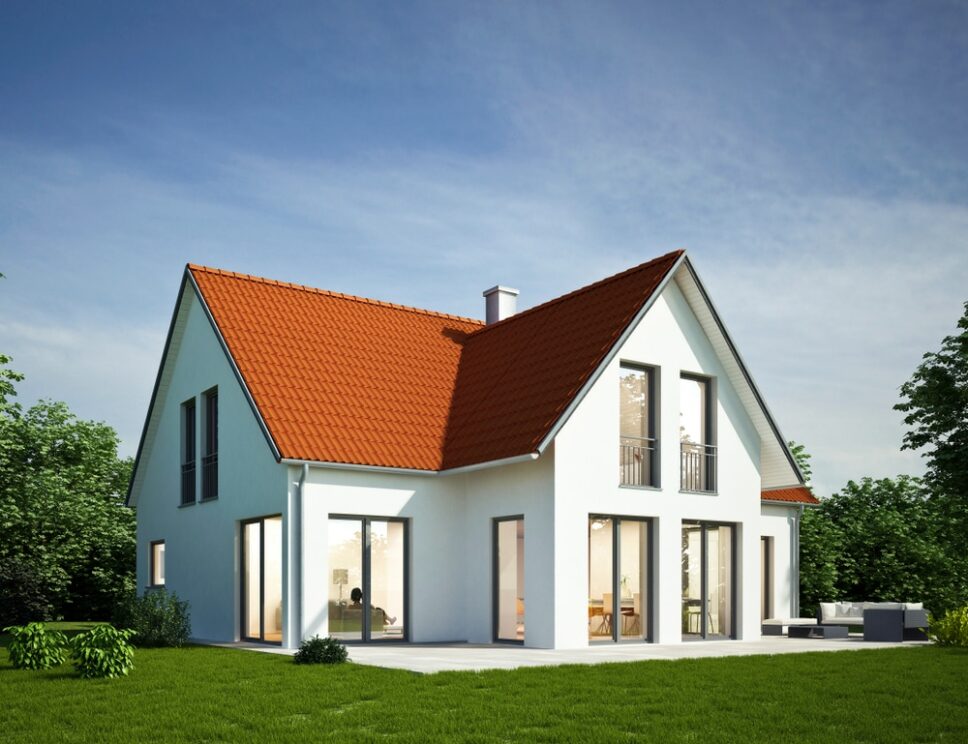
Choose aluminium windows and doors for self-build homes, and you are getting arguably the most flexible material in terms of design. From classically styled aluminium with a flush casement design to the latest steel-look designs, ultra-slim or minimalist glazing and more, aluminium windows and doors really give you the most options. And aluminium remains one of the best materials for all types of patio doors. Whilst bifolding, sliding and French doors are all available in other materials, aluminium creates slimmer doors, larger panel sizes and more opening and styling options.
Aluminium windows are widely marketed as low maintenance, do not assume aluminium is a fit-and-forget material. Some maintenance is inevitable such as routine cleaning to maintain the surface appearance. And never put off repairing damaged paint on aluminium windows and doors.
Aluminium windows pros
- Anticipated lifespan of around 30 years
- The most choice in styles and designs
- The biggest choice of colours and surface finishes
- Larger sizes, means fewer mullions and transoms
- Best material for patio doors of all types
Aluminium windows cons
- Timber and alu-clad are better performing
- Can be harder to repair windows out of guarantee
- Not the best material for ‘timber-look’
- Needs routine cleaning to look its best
Timber windows and doors
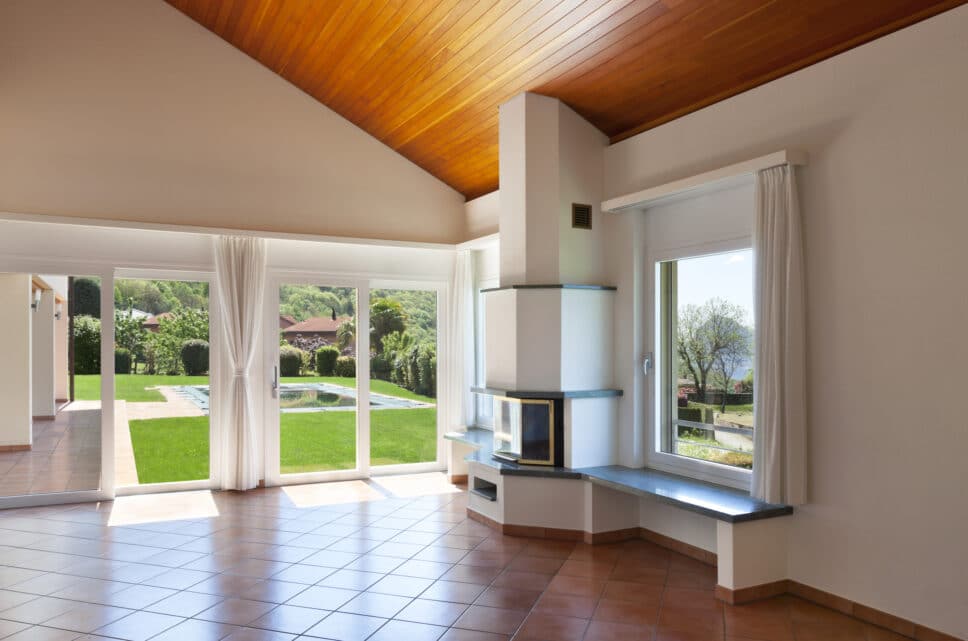
The professional companies that make or supply wood windows are the best people to give you honest advice about timber windows and doors if you are considering these for your self-build home. PVCu and aluminium window companies will routinely say that wood windows are high maintenance. Don’t assume this is true. The technology applied to the woods, paints, hardware and components with modern timber windows and doors is cutting-edge, giving you arguably the longest-lasting window available, which is why so many period buildings have wood, still performing reliably after more than one hundred years.
With the quality and craftsmanship of fine joinery, timber is warm to the touch and provides some of the best window U-Values and the longest service life. If timber windows suit your self-build, these are one of the best products to have for your glazing. And timber windows and doors are also one of the most sustainable and environmentally friendly options.
Timber Windows pros
- Lifespan of over sixty years
- Warm feel and some of the most energy-efficient
- Contemporary and traditional designs
- Fantastic choice of colours and hardware
- Older windows easier to repair than PVCu/aluminium
Timber Windows cons
- You will need to repair any damaged paint
- Don’t come as slim as aluminium or alu-clad
- A bigger upfront investment
- Fewer opening/functional options than aluminium
Alu-clad or hybrid windows and doors
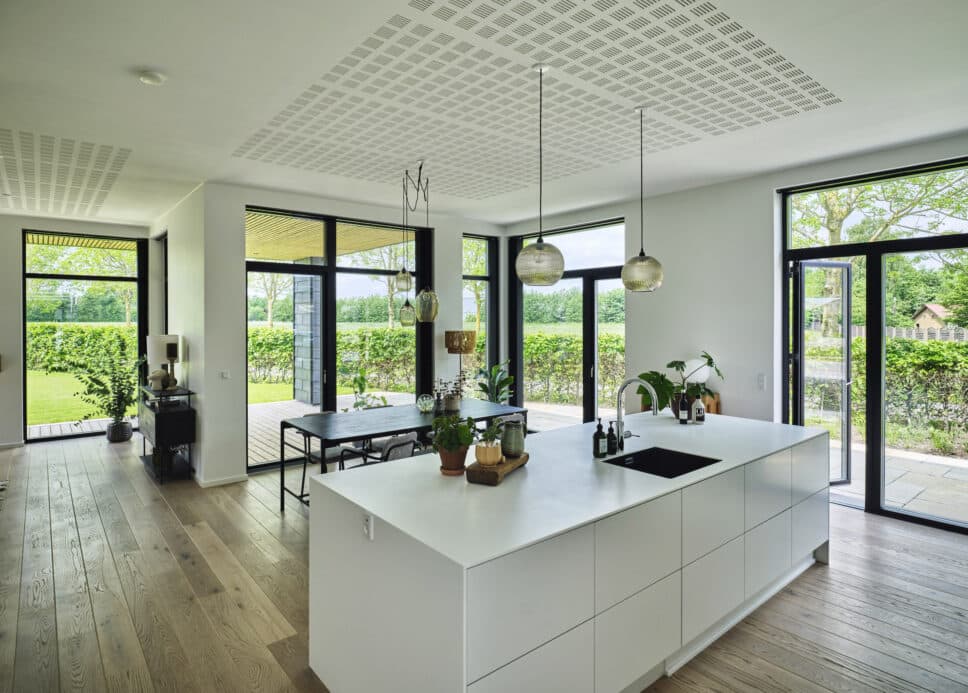
Arguably giving you the best of both worlds, alu-clad windows and doors comprise aluminium on the outside and wood on the inside. Many alu-clad windows are made in Sweden or Denmark, and you’ll frequently see alu-clad used on Grand Designs and other new builds. Warm wood inside, and protective aluminium outside, alu-clad is designed to last and perform, also providing some of the best window and door insulation of any material. They also look fantastic viewed from the inside or outside and also look and feel crafted and luxurious.
This combination of materials also extends to aluminium outside and PVCu inside with some systems, again combining the benefits of two different materials. Widely available in all manner of window styles, their only limitation is the types of bifolds and sliding doors available. If you care about sustainability and the environment, these also fit the bill.
Alu-clad Windows pros
- Lifespan in excess of sixty years
- Superb styling and quality inside and out
- Offer the best in low U-Values and insulation
- Danish design and quality works in most homes
- Slimline and classic styling available
Alu-clad Windows cons
- A bigger upfront investment
- Patio door range not as broad as aluminium
- Fewer specialists to repair older windows
- Handle choices and colours can be limited
Steel windows and doors
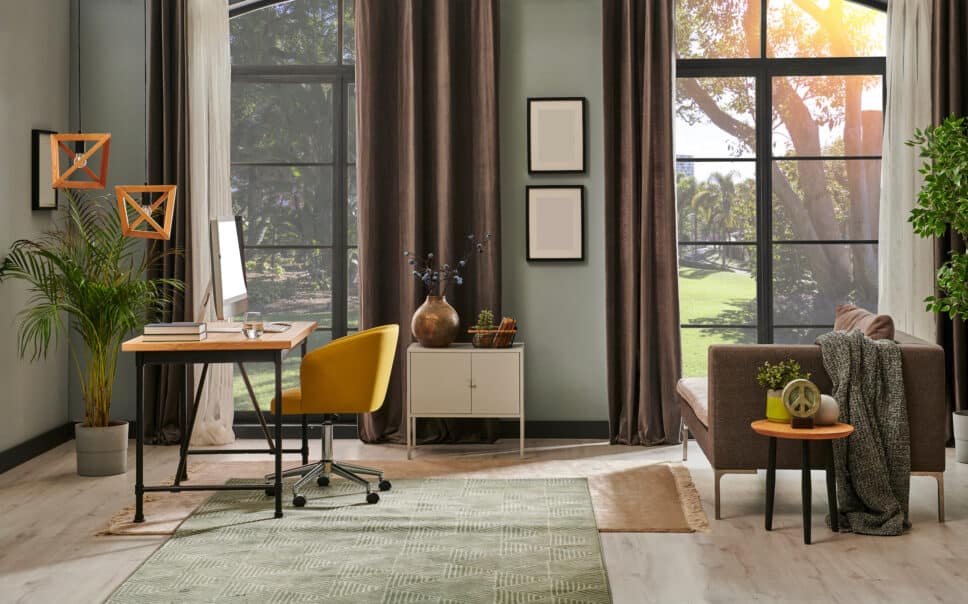
If your budget stretches to steel windows and doors, the luxurious and longest-lasting choice will reward you with exceptional quality, a distinctive style, and the slimmest frames available. These are the most expensive option for windows and doors for self-build homes, but nothing looks, feels or lasts like a steel window.
The steel industry has improved the material’s thermal performance, despite its limitations technically, and there is no reason why steel windows can’t meet current Building Regulations. Colour choices are extensive, as is the range of gorgeous window handles and accessories. Of course, steel provides an authentic steel look. Such is the popularity of steel today, there are many expert suppliers, and it is also worth getting in touch with the Steel Windows Association.
Steel windows pros
- The longest lasting window material
- The slimmest available frames
- Outstanding quality and fully welded
- Provides the most authentic steel-look
- Distinctive overall appearance
Steel windows cons
- The most expensive option for glazing
- Sliding or bifold doors are usually unavailable
- Doesn’t achieve the best U-Values
- Steel windows will require specialist repair
PVCu or uPVC windows and doors
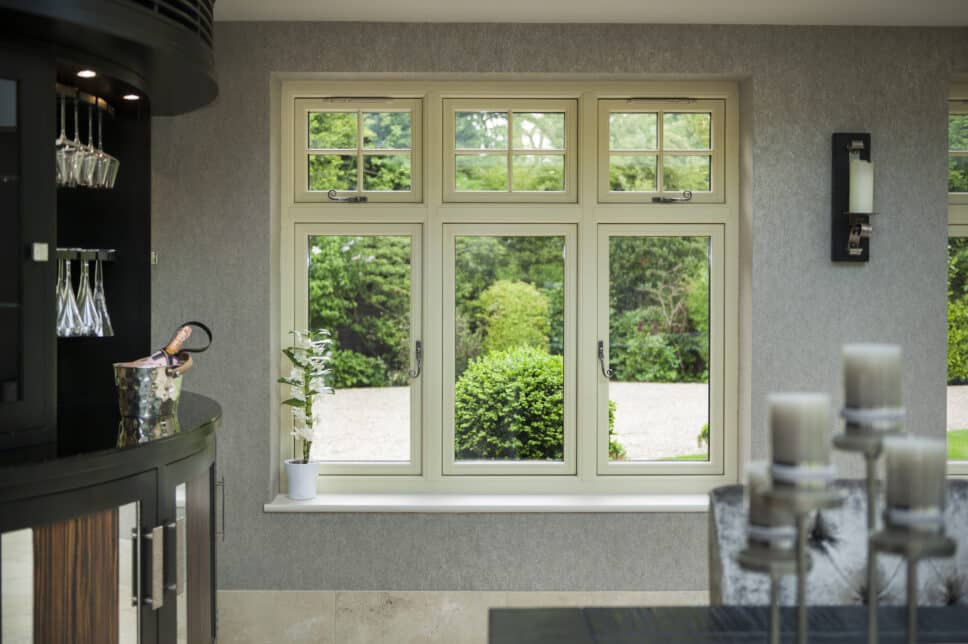
Whilst there are still cheap and cheerful PVCu windows on the market (and it shows), this material is substantially better than ever before in terms of window and door quality, styling and construction. The cheapest option for windows and doors for self-build homes, with also more luxurious products available at a higher price premium. Choose the right product from a quality system, and PVCu windows remain a good choice.
Because of the material limitations, you will unlikely find slim windows, but where PVCu excels is in replicating wood windows with flush casements, mechanical corners and great foil finishes in colours or wood effects. PVCu has also done the best job of replicating timber sash windows. PVCu is still not the best choice for patio doors, especially bifolding and sliding designs, as doors remain thick, chunky and not that appealing or reliable. Just avoid the cheaper windows and suppliers, choosing instead to go with the premium and better-made brands. We can help with these, so do get in touch.
PVCu windows pros
- The most affordable option and widely available
- Very good U-Values and security
- Surface finishes are now great
- Windows with mechanical joints look premium
- Great as timber-look, sliding sash and flush casements
PVCu windows cons
- Can look dated quite quickly
- PVCu bifolding and sliding best avoided
- Slim PVCu windows are anything but
- These are plastic windows
Security, energy-efficiency and weather sealing
Windows and doors for self-build homes today come with transparent security certifications and accreditations. Expect to see credentials such as PAS24:2016, Document Q for new build homes, Secured by Design accreditation with most window systems. You may also see European standards such as RC2 or RC3. Good window and door security is today a given, and there are few windows and doors don’t offer a reasonable level.
For window and door U-Values and Energy-Ratings, current Building Regulations now mean new build properties for both windows and doors require better-performing windows. SAP 10, also known as the Standard Assessment Procedure is used on new building projects.
All quality systems are subjected to independent air, wind and water tests, so you will unlikely find a poorly-performing window. Of course, some perform better than others, but again you can expect a good standard with all materials when it comes to weather protection. But do discuss your requirements if your home is coastal or in a more exposed location.
Glass is naturally the primary element in doors and windows, and all windows and doors for self-build homes come with a substantial amount of options. Triple glazing, solar control, self-cleaning glass and obscure glazing for bathrooms are just some of the options. Additionally, the option of improving privacy with integral glass blinds is worth considering. Acoustic glass provides enhanced sound protection if your self-build home is on a main road, near a school or another noisy location. Hybrid and timber window frames provide the best in acoustic performance here, combined with this glass.
Windows and doors for self-build homes – there is no ‘bad’ window
With so many regulations and quality standards applicable to UK-made windows and doors, there are certain areas where you can expect a good standard of quality and compliance, whatever brand of windows you choose and whether PVCu, aluminium or wood. It is incredibly easy to check that your windows and doors comply with established standards. You can get in touch with us or a professional manufacturer or installer.
Therefore, there is no need to be swayed by marketing messages promising premium-grade aluminium or giving the impression that glass, seals, gaskets and colours are somehow better than the competition. Most windows and doors for self-build homes must use materials to set standards of quality. Moreover, the glazing industry uses the same testing houses. Products are registered with the same security associations or organisations and this is your reassurance that there is no bad product on the market by design. The dissatisfaction you may read about is usually down to bad manufacturing and installation.
Where the better windows and doors differ is a more sophisticated engineering and design, a greater choice in styling, more functions and features, and a bigger and more advanced choice of colours. These usually also offer bigger size capability, fewer limitations, top-end components, higher security and weather protection ratings and, of course, reputation.
More information and where to buy windows and doors for self-build homes
Use our contact form to get in touch for more information about windows and doors for your self-build or renovation projects. Free advice and putting you in touch with the best products from the proper suppliers.











